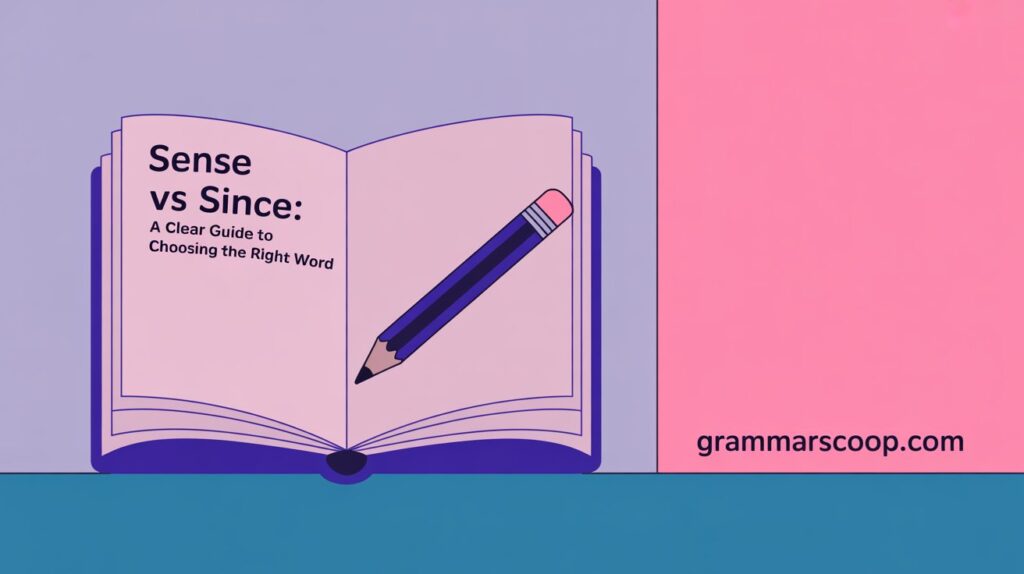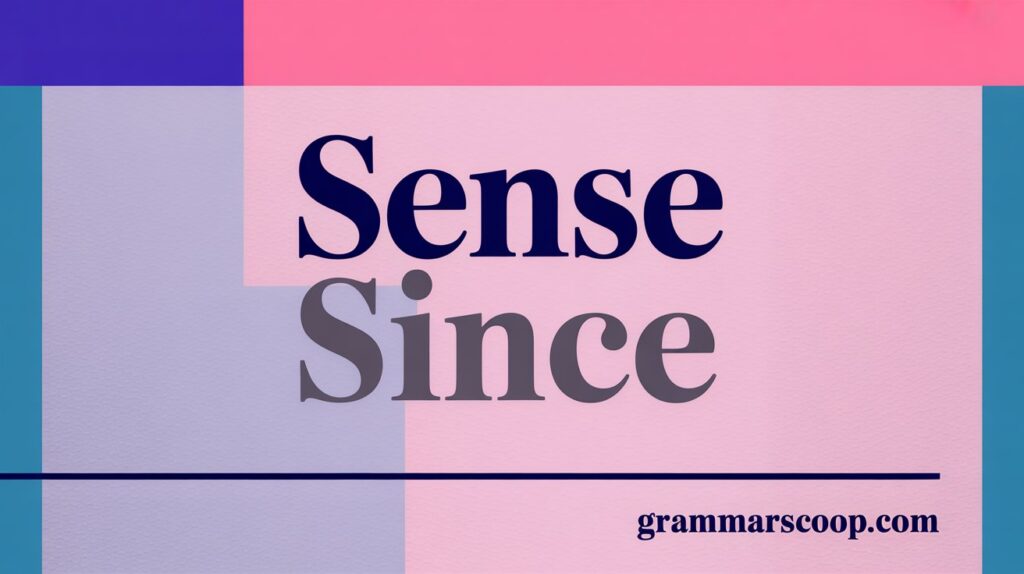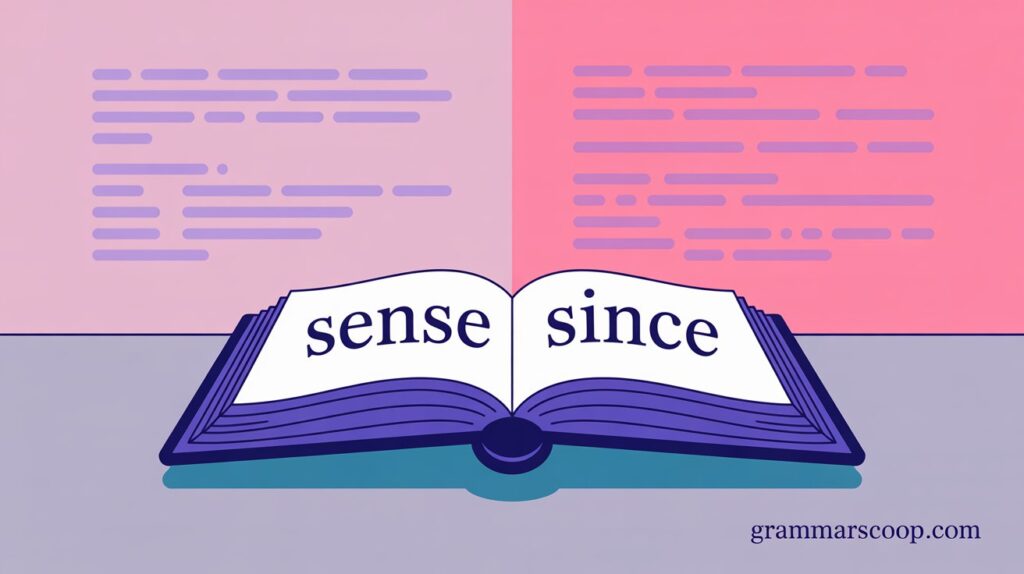Understanding the difference between “sense vs since” is more than just a grammar fix—it’s a way to make your writing sound smarter, clearer, and more human. Whether you’re writing an email, a blog post, or even a text, misusing these two can confuse your reader and undercut your message.
This guide breaks down every angle of the “sense vs since” puzzle using real-world examples, comparisons, and tips. If you’ve ever paused mid-sentence wondering, “Does that make sense or since?” — you’re not alone.
Quick Overview: Why These Two Words Confuse People
At first glance, “since” and “sense” seem worlds apart. One deals with time and reason; the other with perception and understanding. But because they sound similar and both fit into casual conversation, they often get mixed up.
Here’s where the confusion starts:
- Both are common in everyday English.
- Both can be used in abstract or literal contexts.
- Spellcheck won’t catch misuses because they’re spelled correctly.
So, when someone writes “This doesn’t make since” instead of “This doesn’t make sense” — it’s easy to miss.
“Since” — A Word That Tells Time and Reason

“Since” is a highly flexible word. It can show the passage of time, explain cause and effect, or even function on its own in a sentence.
“Since” as a Conjunction
Used to connect two clauses, “since” helps express a reason.
Example: Since it was raining, we canceled the picnic.
In this case, “since” means because. However, there’s a nuance:
While “since” can mean “because,” it’s more formal and slightly softer. It’s often used to imply cause indirectly.
“Since” as a Preposition
When showing time, “since” links an event in the past with something ongoing in the present.
Example: I have been working from home since 2020.
Here, “since” introduces a point in time, anchoring the sentence.
Common Time Markers with “Since”:
| Time Marker | Example |
|---|---|
| A date | since March 10 |
| A year | since 2015 |
| An event | since the accident |
| A phrase | since I graduated |
“Since” as an Adverb
Sometimes “since” works alone as an adverb to imply a time period.
Example: We met at college and haven’t spoken since.
In this case, “since” still refers to time, but the clause it connects is implied.
“Sense” — A Word Full of Meaning and Perception
Unlike “since,” which deals with time and causality, “sense” focuses on feelings, understanding, and perception.
“Sense” as a Noun
“Sense” as a noun is one of the richest words in English.
It covers:
- Physical perception: sight, hearing, taste, touch, smell
- Emotional awareness: a sense of dread, a sense of pride
- Mental grasp: making sense of a concept
- Moral judgment: common sense, sense of right and wrong
Examples:
- She has a good sense of direction.
- There was a sense of urgency in his voice.
- Use your common sense.
Common Expressions with “Sense”:
| Expression | Meaning |
|---|---|
| Makes sense | It’s logical or understandable |
| Come to your senses | Return to rational thinking |
| No sense crying over spilled milk | Don’t worry about what can’t be changed |
“Sense” as a Verb
As a verb, “sense” means to perceive or detect something.
Example: I sensed he was unhappy, even though he smiled.
It’s a more intuitive or instinctive feeling than something directly observed.
Verb Synonyms:
- Detect
- Feel
- Perceive
- Smell (in context)
Common Confusion: When “Since” and “Sense” Collide

Let’s talk about real-world confusion. Phrases like “does that make since?” pop up everywhere, from social media posts to business emails. Why?
Because the ear hears one thing, and the fingers type another. Homophones (words that sound alike but have different meanings) are common culprits in English.
Quick Trick to Remember:
- “Since” = time or cause
- “Sense” = feeling or understanding
If you’re asking someone if something is logical or understandable, it’s always “Does that make sense?”
Real-Life Examples in Action
Nothing beats examples when learning usage. Here are side-by-side sentences to cement the difference.
“Since” in Sentences
| Context | Sentence |
|---|---|
| Time | I haven’t seen her since graduation. |
| Cause | Since it’s your birthday, dinner is on me. |
“Sense” in Sentences
| Context | Sentence |
|---|---|
| Feeling | I had a strange sense that something was off. |
| Understanding | Your explanation makes perfect sense now. |
Swappable Words: Alternatives to Use with Caution
Knowing what can replace “since” or “sense” helps strengthen writing while avoiding repetition.
Alternatives for “Since”
When indicating time:
- From
- After
- Beginning in
When indicating reason:
- Because
- As
- Due to
Examples:
- I’ve been tired since Monday. ➔ I’ve been tired from Monday onward.
- Since you’re busy, I’ll call back later. ➔ Because you’re busy…
Alternatives for “Sense”
When referring to feeling or perception:
- Feeling
- Awareness
- Perception
When referring to logic or understanding:
- Reason
- Meaning
- Clarity
Examples:
- I sense tension in the room. ➔ I feel tension…
- That doesn’t make sense. ➔ That doesn’t have meaning.
Explore further:
- Cacoon or Cocoon: Which Spelling is Correct?
- Past Tense of Swing? Is It Swing, Swang, or Swung?
- Re-sign Vs Resign? Understand the Proper Usage of Each
- Cancelation or Cancellation: Which Spelling is Correct?
- Busses Or Buses: What’s the Proper Plural of Bus?
Etymology: Where “Since” and “Sense” Come From
Understanding the origins can help clarify how “since” and “sense” evolved into what they mean today.
“Since”
- Origin: Latin “sciens” (knowing)
- Evolved through Old and Middle English
- Originally meant “ever after”
“Sense”
- Origin: Latin “sensus” (perception, feeling)
- Root of many English words: sensitive, sensor, sensation
Fun Fact: Shakespeare used both “since” and “sense” in different plays — proving their relevance across time.
Practice Quiz: Test Your “Since vs Sense” Smarts
Try these and check your understanding.
Fill in the blanks:
- I haven’t eaten anything ______ morning.
- _That explanation doesn’t make any _____.
- We were late ______ the car wouldn’t start.
- He has no ______ of personal space.
- I ______ something was about to go wrong.
Answer Key:
- since
- sense
- since
- sense
- sensed
Final Thoughts: Keep It Clear, Not Confused
Mixing up “since” and “sense” can slip past even native speakers. But with a solid grasp of their meanings and contexts, you’ll avoid mistakes and write with more confidence.
Remember:
- Use “since” for time or reason
- Use “sense” for perception, logic, or feeling
- Ask yourself, “Does that make sense or since?” If it’s about understanding, the answer is sense
Still unsure? Read it out loud. If it sounds off, it probably is.
And just to recap:
| Word | Meaning | Usage Example |
|---|---|---|
| Since | Refers to time or cause | Since you called, I’m happy now. |
| Sense | Refers to feeling or understanding | That makes total sense to me. |
Master the since versus sense distinction, and your writing will instantly sound clearer, sharper, and more intelligent. The difference may seem small, but the impact? Huge.
“Words are, in my not-so-humble opinion, our most inexhaustible source of magic.” — Albus Dumbledore (J.K. Rowling)

Lisa Morris is a seasoned blogger and language enthusiast with a passion for making grammar simple and engaging. At Grammar Scoop, she shares clear, concise tips that help readers master the rules of English with confidence.






